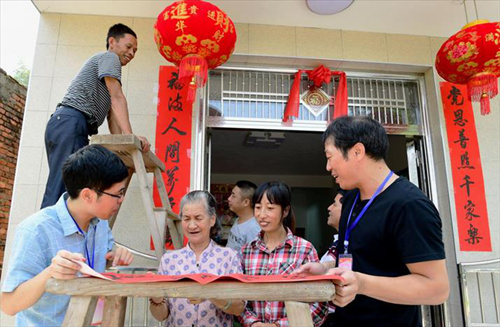By Tom McGregor, CCTV.com Panview commentator and editor
Editor's Note: CCTV.com Panview presents 'China Cares' — series of special coverage on China's rural reforms, charities and comprehensive efforts to help those in poverty unlock their potential for success.
The Chinese government, the United Nations and media have often spoken about Beijing's efforts to eradicate poverty in a country with around 1.4 billion people. Since the mid-1980s, more than 700 million Chinese have fled impoverished conditions.
Yet every country holds similar dreams to lift up their poor, so what did Beijing do differently to achieve such remarkable results? The Chinese government with President Xi Jinping serving the helm has highlighted a long-term approach to reduce poverty in the nation.
Ensuring 'targeted' poverty alleviation
China's Cabinet, State Council, listed poverty eradication as one of the key goals for the Communist Party of China (CPC) and the Central Government. The 18th National Congress of the CPC in 2012 called for the elimination of poverty in the country by 2020.
Beijing had set up the State Council Leading Group Office of Poverty Alleviation and Development. Chen Zhigang, Deputy Director of the council, delivered a speech in Addis Adaba on June 21, 2017 to define China's overall poverty alleviation strategy.
Chen noted that Beijing has undertaken "large-scale, well-organized and planned programs on poverty alleviation since the mid 1980s."
According to figures, more than 700 million Chinese were lifted out of poverty, which accounts for 70 percent of the world's total. From 2013 to 2016, approximately 55 million rural residents have enjoyed higher incomes.
Statistics that really matter
Income growth rates in rural regions, particularly in the central and western parts of China, had risen above the national average in recent years. Beijing had focused on western rural regions for 'targeted' poverty alleviation.
329 central departments were assigned to pair up with 592 destitute counties, and 68 centrally-administered state-owned enterprises (SOEs) are assisting 108 designated impoverished counties.

(On September 21,2017, an official from Fengpu Township of Ningde, Fujian Province, prepares red couplets with a family who had just moved to a new resettlement house thanks to poverty-relief efforts from the local government. Photo from Xinhua)
More than 10,000 poor villages have received more access to better sewage, clean drinking water and electricity, along with infrastructure building, such as roads, bridges and so much more.
Many western villages and towns have been rebuilt to lure migrant workers back home. Meanwhile, 18 developed provinces and municipalities, mainly in the southern and eastern regions, have offered support to less well-developed provinces and autonomous regions in the west.
Developed regions have deployed skilled professionals, innovative ideas and big-time investments to the rural areas and there's more balanced development in China.
Xi lends a helping hand
"Helping people to live a better life is the original intention and ultimate goal of our entire work. China has constantly adhered to the principles of depending on the people, serving the people, making the people share the results of development and striving for common prosperity," said President Xi.
He added, "To this end, the Central and local governments have been prioritizing issues concerning poor people's living necessities, compulsory education, basic medical care and housing."
In 2016, the Central Government has granted RMB100bn. (US$15.09bn.) and offered a micro-financing credit line valued at - RMB170.6bn(US$25.92bn.).
Additionally, over 8.02 million poor households have received small loans, totaling RMB283.3bn. (US$42.75bn.). Most loans were delivered to enhance the lives of specific groups: women, children and the elderly.
The 'targeted' groups are expected to avoid self-dependence on welfare and must continue to demonstrate hard work and diligence.
Targeted approach with targeted measures
Beijing believes it has successfully met major goals to reduce poverty by taking a "targeted approach" with "targeted measures,"
through defining clear standards when funding projects and selecting recipients.
Local governments are required to provide specific solutions for communities, since a one-size-fits-all approach is ineffective. They must lift people out of poverty based on local realities.
Measures have been taken, such as conducting surveys and storing the information on a big data platform. By analyzing the data, local governments can introduce measures for every poor person, household and village that is registered under them.
Specific action plans could entail developing localized industries - rural tourism, logistics and manufacturing - stronger social safety net, and compensation for ecological conservation.
Greater efforts could be made in localized healthcare, education, finance, infrastructure building, micro-finance and helping small family-owned business grow.
Ushering in new opportunities for rural poor
Yes indeed, the Chinese government has made significant progress in transforming the nation’s economy. But more can be done, since people escaping poverty only means they have some extra money.
The next step is for China's poor to take advantage of opportunities to get better jobs for improved standards of living. Vocational training offers the right solution to teach essential jobs' skills for China's workforce.
There's no shame in being poor, but if the poor refuse to get a proper education and shun hard work, they will end up falling off the path to prosperity.
Many poor households aspire for greater wealth, and they are willing to stay diligent to achieve those goals. And the Chinese government has lent them a helping hand to succeed.
(The opinions expressed here do not necessarily reflect the opinions of Panview or CCTV.com. )

Panview offers a new window of understanding the world as well as China through the views, opinions, and analysis of experts. We also welcome outside submissions, so feel free to send in your own editorials to "globalopinion@vip.cntv.cn" for consideration.
















